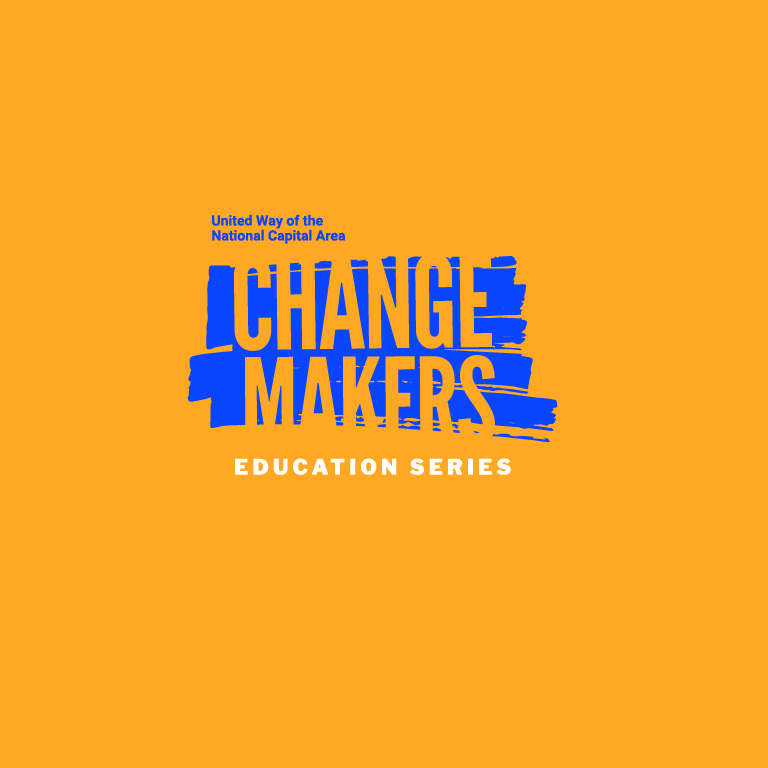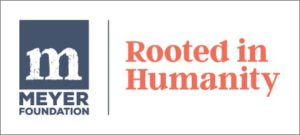United Way NCA’s Change Makers Education Series

What is the Change Makers Education Series?
United Way of the National Capital Area is uniquely positioned at the intersection of public, private, philanthropic and nonprofit sectors to bring the best resources, individuals and organizations together to solve our region’s most pressing issues facing our community today. United Way NCA is launching a 10-part Change Makers Education Series to convene thought-leaders in conversations focused on trends in the National Capital Area and solutions that advance equity in the region. Topics will include intersectionality of gender and equity, racial equity in program design and effectiveness, the impact of COVID-19 on mental health and more. When none are ignored, all will thrive.
Change Makers Education Events
The Importance of Volunteerism
In honor of National Volunteer Month, our 10th Change Makers Education Series event focused on the importance of volunteering in the National Capital Area.
Panelists included Daryl Wright, Senior Vice President of Community Outreach at So Others Might Eat (SOME); LaKendra McNair, Senior Vice President, Community Climate Resiliency, Environmental, Social & Governance Office at M&T Bank; and Briana Cleveland, Director of Volunteer Engagement at Martha’s Table.
Daryl Wright, who led the Emergency Services Department for several years, is leading SOME’s community outreach department as the Senior Vice President of Community Outreach. His shared passion for community and service of vulnerable and disadvantaged populations spreads over three decades. During his career he has managed programs in the arts, the foster care system, medical and mental health services, and educational financing. A native Washingtonian, his educational background includes a B.A. in Finance from South Carolina State University and certifications from the Investment Training Institute. He currently serves on the Board of the Better Way Program Recovery Support Services and the HOPE Foundation Reentry Network. Daryl is the proud grandfather of two.
LaKendra McNair is an experienced banking professional, thought leader, diversity and inclusion advocate, and curator of equitable engagement in the community. LaKendra is committed to being a change agent for bridging the gaps of access to information, advocacy and social capital in diverse, underrepresented and economically evolving sustainable communities. LaKendra is a thought leader in corporate social governance, intersectional talent development and consumer experience-led transformation.
Briana Cleveland is a seasoned stakeholder engagement professional with more than 10 years of experience supporting executives and strategic initiatives. Briana’s areas of expertise include stakeholder engagement, communications, fundraising, project management, professional development, board management, operations and event planning. Briana holds a Masters of Professional Studies in Strategic Public Relations from The George Washington University’s Graduate School of Political Management.
Racial Equity and Philanthropy
VITA/EITC and Their Impact on Equity
This discussion was co-moderated by United Way NCA Sr. Vice President, Marketing & Fundraising Nedelka Phillips and Citigroup Vice President Reginald Exum. Speakers on the panel include Michelle Hammonds and Victoria Saunders.
Reginald Exum is a Vice President/Community Relations Market Manager with Citigroup (Citi) and a member of its Community Relations team, based in the Greater Washington, DC area. He joined Citi in 2008 and, in his current role, focuses on implementing strategies and building relationships with organizations that conduct programs in financial capability, youth economic opportunities, small business and affordable housing in low- and moderate-income communities. Exum has worked in the financial services industry for more than 20 years and has held positions in commercial loan analysis, marketing research, residential mortgage lending and bank operations.
Michelle Hammonds is the Inaugural Director of Financial Empowerment and Education at the Department of Insurance, Securities and Banking. In her current role, she works diligently to provide financial empowerment programs and financial education resources to the residents of the District of Columbia from ages 9 to 99. When she joined District Government in 2016, she managed the Bank on DC Program, working with financial intuitions and nonprofit organizations to provide access to safe and affordable financial services and products for unbanked and under-banked households in the District of Columbia.
Victoria Saunders is the Site Coordinator for the Financial Empowerment Center at Prince George’s Community College. She has served as the coordinator since its inception in 2015. Victoria is a proud Alumni of the AmeriCorps VISTA program where she supported the Prince George’s CASH Campaign in expanding free tax programs in the county. Victoria currently supports the VITA tax program as a year-round coordinator where she helps low to moderate income clients become up to date with their back taxes. She is a native of Prince George’s County and a proud graduate of Prince George’s Community College.
See Washington, DC Mayor Muriel Bowser’s Proclamation on Earned Income Tax Credit Awareness Day here.
Addressing Systemic Barriers That Create Health Disparities During Public Health Crises – November
Learn more about how we as a community can work together to address systemic barriers that create health disparities. Moderated by United Way NCA President & CEO Rosie Allen-Herring, the panel included experts from the health care industry that are committed to eradicating inequities in our health care system.
This panel discussion explored the factors that contribute to the persisting inequities we find in health, the unique healthcare needs of residents across the region, as well as the structural changes and mind shifts that are necessary for growth. Being at the epicenter of the nation’s political landscape, we must leverage our power and influence to initiate change.
Project Community Connect – October
To learn more about this year’s Project Community Connect, head to unitedwaynca.org/pcc.
Engaging Youth Voice in Voting Rights Equity
In this episode of our Change Makers Education Series, United Way of the National Capital Area brought together experts in the field to discuss how we as a community can increase equity of youth voice in voting rights to support generations to come.
A Vision For Economic Justice in the Greater Washington Region
Greater Washington is home to nine of the 20 wealthiest counties in the United States — but families in our community are not equally sharing in this wealth. By almost every measure — education, income, housing, health and wealth — our community’s Black, Brown and other communities of color are significantly lagging behind their white neighbors. As home to the nation’s capital, and all the prestige, influence, wealth and power it provides, we can and must do better.
Watch this virtual event moderated by United Way NCA President & CEO, Rosie Allen-Herring, to learn more about the Greater Washington Community Foundation’s strategic vision to close the racial wealth gap. Tonia Wellons, President & CEO, and Ronnie Galvin, Managing Director, Community Investment, share the impetus behind the strategy and the interventions that The Community Foundation plans to pursue to advance economic mobility in our region.
The Impact of COVID-19 on Women in the Workforce
For the first event of United Way NCA’s Change Makers Education Series, we virtually convened thought-leaders to look “The Impact of COVID-19 on Women in the Workforce,” what it means when we lose women in the workforce, the disproportionate impact facing Black and Latina women and new opportunities for women returning to work post-COVID. This conversation was moderated by our President & CEO Rosie Allen-Herring, alongside panelists FlexProfessionals Co-Founder Sheila Murphy and Executive Director of the Mayor’s Office on Women’s Policy and Initiatives (MOWPI) Jennifer L. Porter.
Below, you will find helpful resources related to women in the workforce:
- 9 Tips to Help You Re-Enter the Workforce with Confidence
- Tips for Finding and Positioning Yourself for Meaningful Part-Time Work
- Top Mistakes Organizations Make When Hiring Talent
- Overview: Flexible Staffing and FlexProfessionals
Approaches to Increase Economic Opportunity for Young Men of Color
Our country’s persistent social inequities are widespread, rooted in structural and institutional racism, and prevent our boys and young men of color from reaching their full potential. The COVID-19 pandemic has exacerbated these challenges, as seen in college enrollment among males of color. United Way NCA convened thought leaders to look at the trends, solutions to supporting youth through middle-school and high-school transitions and approaches to increase economic opportunity for young men of color that puts them on a path to college and a career.
Led by United Way NCA Vice President of Community Impact & Engagement Ian Gordon, event panelists include Heath Carelock, Anthony Featherstone, Brian Heat and Eldridge Allen.
Below, you will find helpful resources related to this topic:
- WorkSource Montgomery Resources
- GWUL’s Center for Financial Inclusion’s Spark Series
- The Washington Post’s “Black University Leaders Say Boys of Color Face Opportunity ‘Crisis'”
- The Metrix Learning System for Businesses
- Virtual Career Services: SkillUpMontgomery
- Diverse Male Student Initiatives at Prince George’s Community College
- “Striving for the Extraordinary” Documentary
The Impact of COVID-19 on Student Mental Health
Mental health has become a critical need in assuring the physical and emotional well-being of youth in our schools today. Yet, there remains a severe lack of resources and services to meet this growing crisis.
According to a national survey this year, one in two teenagers aged 13 to 18 will experience a mental disorder at some point during their lifetime, and one in 10 youth in the U.S. suffer from severe depression (this risk is higher for every one in seven multiracial youth). Over 60% of youth with major depression do not receive any mental health treatment.
As part of United Way of the National Capital Area’s Change Makers Education Series, Dr. Olga Acosta Price, Director of the Center for Health and Health Care in Schools and Associate Professor in the Department of Community and Clinical Health at the George Washington University, joins a panel of adolescents from high schools in Washington, DC to describe the impact of social and environmental characteristics on their lives and futures.
Through a blend of youth voices and a model for comprehensive school health, this presentation seeks to illustrate the ways that society can build school and community environments that jointly foster health and opportunities for all students to thrive.
LGBTQ Support Services: How Data and Policies Influence Solutions
This fireside chat was held in partnership with SMYAL (Supporting and Mentoring Youth Advocates and Leaders)’s Deputy Executive Director Jorge Membreño. Drawing from anecdotal, regional and national data, SMYAL utilizes a comprehensive needs assessment to provide community support to LGBTQ youth. These supports remain dynamic as the landscape of policy and funding streams adapt to the needs of youth. Learn more about what SMYAL does for the local community here.
Proud Partner
About United Way NCA
United Way NCA is working to create a more equitable society, where everyone in our community has fair and equal access to health, education and economic opportunity. Our programs tackle inequity in its many forms, including food insecurity, homelessness and systemic racism. We’re agents of change, challenging others to practice equity for the sake of those who are most in need, yet most overlooked.
Our programs are focused on serving the ALICE (Asset Limited, Income Constrained, Employed) population—households that earn more than the Federal Poverty Level, but less than the basic cost of living.
